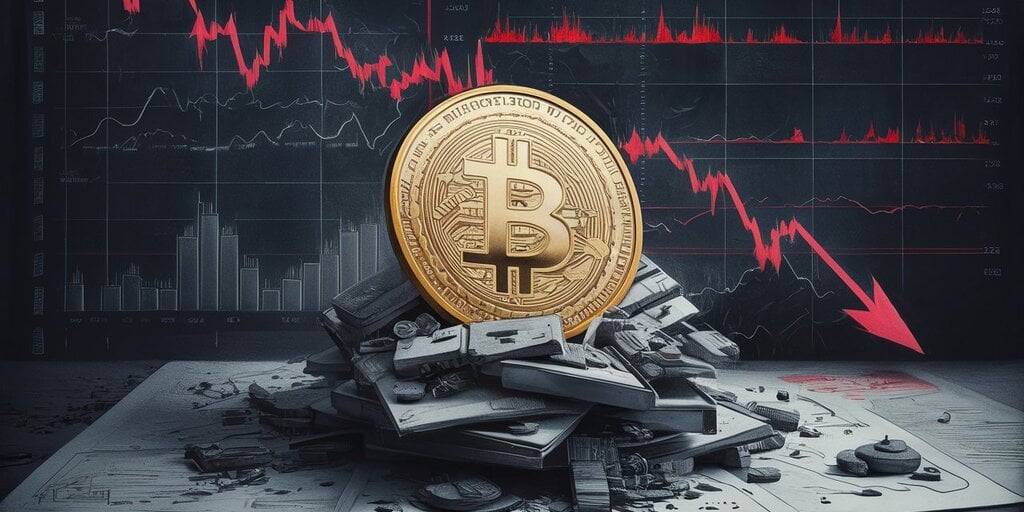Bitcoin seizures by law enforcement are nothing new. But there has been a recent shift in how agencies liquidate their seized BTC—and it’s been wreaking havoc on markets.
After moving $75 million worth of Bitcoin to exchanges yesterday, the German Bundeskriminalamt has transferred another $84 million worth of Bitcoin just this morning, according to blockchain analytics platform Arkham. At the time of writing, $30 million has already been forwarded on to trading firm Flow Traders.
This selling of seized Bitcoin on exchanges—coupled with the impending release of Mt. Gox Bitcoin holdings—has reignited discussions about how governments handle large-scale cryptocurrency liquidations.
It wasn’t always the case that government wallets would send large tranches of Bitocoin to exchanges. Arthur Cheong, Founder, CEO & CIO at DeFiance Capital, wondered aloud on Twitter why governments have shifted away from using public auctions.
Anyone have good explanation on why governments prefer market selling BTC either via OTC or directly on exchanges now vs auction where they used to do so in the past?
These BTC are likely to fetch premium as well given provenance and clean background.
— Arthur (@Arthur_0x) July 4, 2024
“Why do governments prefer market selling BTC either via OTC or directly on exchanges now vs auction where they used to do so in the past,” he wrote. “These BTC are likely to fetch premium as well given provenance and clean background.”
Matthew Kaye, Head of Operations and Strategy at Intuition Systems, told Decrypt that it appears governments may be prioritizing expediency over maximizing returns.
“The U.S. deficit suggests that the government may not prioritize or have the expertise to execute the sale of their Bitcoin holdings in a manner that maximizes value,” he said. “It’s likely that selling this inventory is seen as a straightforward task to be completed, favoring the easiest and most expedient route rather than achieving the best possible price.”
That may not be the only reason. In many cases, governments are finding that they’re sitting on big unrealized gains, said Ganesh Swami, CEO and co-founder of Covalent.
“Most of the BTC was recovered/confiscated when it was below 20k,” Swami said. “They don’t really care about a 5-10% difference.”
This view suggests that governments might be satisfied with the significant gains already realized, making the potential premium from auctions less appealing, he added.
Silk Road Bitcoin auctions
The evolution of government strategies for Bitcoin liquidation can be traced back to early, high-profile cases.
The United States Marshals Service (USMS) pioneered Bitcoin auctions, notably selling assets seized from the Silk Road darknet market in 2014 and 2015. But the USMS was also said to have lost billions of dollars for selling its seized Bitcoin too early.
However, as the cryptocurrency market has matured and liquidity has improved, many governments have shifted towards market-based methods.
Finland’s customs agency, for instance, partnered with cryptocurrency brokers in 2023 to sell approximately 1,890 Bitcoin seized in criminal investigations. Similarly, in 2021, the Swedish Enforcement Authority collaborated with a cryptocurrency exchange to sell seized Bitcoin through their trading platform.
Darren Franceschini, co-founder of Fideum, highlights another factor influencing government decisions: Buyers might prefer to steer clear of funds that were illegally obtained.
“The rationale behind governments opting to sell Bitcoin (BTC) on the open market instead of via auctions likely stems from the origins of the BTC they hold, which are often tied to illicit activities,” he said. “As a result, institutions generally prefer to acquire clean BTC rather than BTC associated with illegal or alternative activities.”
This insight underscores a potential paradox: While Bitcoin’s clean provenance post-government seizure could fetch a premium in auctions, its association with criminal cases might make it less appealing to institutions who might otherwise want to buy it.
The upcoming liquidation of Mt. Gox Bitcoin holdings adds another layer of complexity to current market dynamics. Although in that case, it will be down to individual creditors—who have waited more than a decade to reclaim their funds—to decide whether they want to realize the gains on their Bitcoin.
Early Friday morning during Asia trading, the Mt. Gox trustee appears to have moved $2.7 billion worth of Bitcoin out of cold storage, according to Arkham.
Edited by Stacy Elliott.
Daily Debrief Newsletter
Start every day with the top news stories right now, plus original features, a podcast, videos and more.
Source: https://decrypt.co/238585/germany-seized-bitcoin-auction



